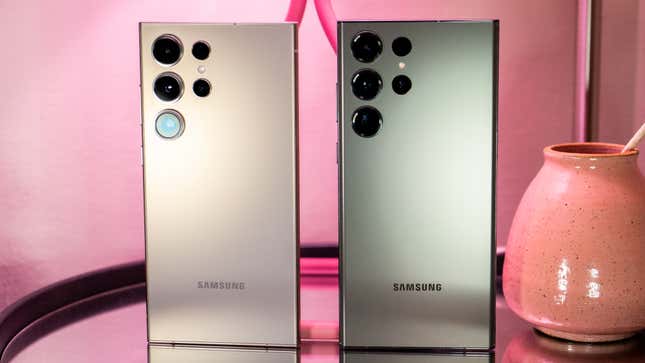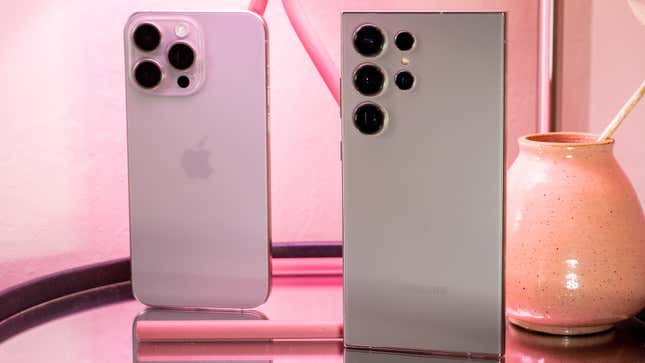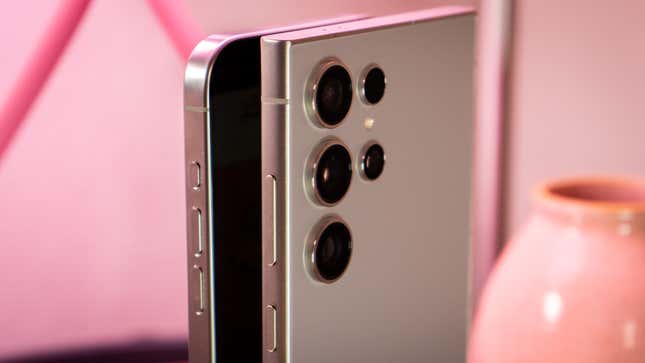ARTICLE AD
Samsung Galaxy S24 Ultra
The titanium pulls everything together, but Galaxy AI's tricks are mostly helpful in small doses.
The massive Samsung Galaxy S24 Ultra doesn't disappoint. But there's nothing here that's screaming, "Upgrade now! Do it!"
Starts at $1,300
Pros
Fantastic display
Titanium Build
Galaxy AI doesn't feel like a total gimmick
Cons
It's the biggest phone you can wield without it being a tablet
5x optical telephoto is sharper, but you still need a tripod to look far
Some apps can make the back of the phone quite toasty
Samsung Galaxy Flip 5: Hands-on first Impressions of Samsung's Pocket-Sized Folding Phone
The Samsung Galaxy S24 Ultra is big, beautiful, and a heck-of-a-lot-of smartphone. It is the best of everything Android can do, as it can do more than the Google Pixel 8 Pro—it has a built-in stylus. But the real kicker of this year’s Ultra release is its titanium finish, which pulls together the whole look of its “ultimate” aesthetic.
No smartphone is perfect, of course, and after a little over a week with the Galaxy S24 Ultra, I am starting to get irked by some of the Ultra’s quirks. For one, it’s still a ginormous smartphone—though, to be fair, it descended from the same model that brought you the “phablet.” Still, it will overpower people with my sized hands. The full titanium backing also gets a little warm on long streaming sessions, which might explain why Apple didn’t go full titanium for the iPhone 15 Pro.
It’s also about $100 more this generation, starting at $1,300 for the 256GB storage version. The good news is that there have been some improvements to this year’s Ultra. But besides the titanium, which we’re all still dubious about its overall durability, the Galaxy S24 Ultra’s best new features are primarily within the software realm. You don’t need Samsung’s latest and greatest hardware to access that.
Galaxy S24 Ultra Features
It’s titanium, baby!
I’m digging the titanium aesthetic that’s taking over premium smartphones. Apple started the trend with the iPhone 15 Pro/Pro Max, and now Samsung is carrying the torch for the Android-wielders of the world. As a result, the Galaxy S24 Ultra is most certainly in a class of its own. It has its own unique colorways, like Titanium Violet and Yellow. Samsung offered Titanium Gray to Gizmodo for review. The only parts of the Ultra’s frame that aren’t titanium are the volume rocker and power button.
As I mentioned, the Galaxy S24 Ultra can get warm if you stream an app like YouTube TV. At one point, I clocked about a 20-degree difference between the top and bottom of the device, though it was fine while watching apps like Pluto TV and Frndly TV. I’ve contacted Samsung to ask why that app might have been causing the heat disparity and will report when I hear back. I’ve also called in some cases to see if it exacerbates the toastiness.
There isn’t much difference in heft or weight distribution from last year’s Galaxy S23 Ultra—at least nothing discernably so. If you’re not used to this much slab of a smartphone on you at all times, it will be a lifestyle change. Compared to the iPhone 15 Pro Max and Google Pixel 8 Pro, it’s about an ounce more dense in weight. The Ultra is the biggest smartphone you can get without bringing home a tablet.

The Galaxy S24 Ultra (left) compared to last year’s Galaxy S23 Ultra (right). Photo: Florence Ion / Gizmodo
At the very least, the S24 Ultra feels easier to cradle because of its angular edges. I’m happy to see that Samsung has finally ditched the curves. I didn’t care for them on the Edge variants from the 2010s. Those same curves made the Galaxy S22 Ultra feel like an unfinished device.
Samsung continues to offer IP68-rated water and dust resistance for its flagship devices. Yes, I do take the smartphone into the shower. Isn’t it nice that I don’t have to bathe with my intrusive thoughts?
Samsung made two minor improvements to the Galaxy S24 Ultra’s screen this year. Like last year’s S23 Ultra, it’s a 6.8-inch Quad HD+ Dynamic AMOLED display with a refresh rate of up to 120Hz. But the screen is now matte-like compared to the shiny exterior of the past two generations of Ultras—no more mirror effect for checking your lipstick.
The S24 Ultra’s display also has a peak brightness of 2600 nits, up from last year’s 1750 nits, surpassing the iPhone 15 Pro and the Pixel 8 Pro’s peak brightness offerings. For some reason, all these smartphone manufacturers began competing for the screen with the most clarity in direct sunlight. No one has commented yet on whether this is an immediate move to respond to the onset of global warming, but I’m assuming that this is why these phones are getting so bright until I confirm otherwise.

The iPhone 15 Pro Max is on the left, in titanium, and the Galaxy S24 Ultra is on the right, also in titanium.Photo: Florence Ion / Gizmodo
I’m on the opposite end of the spectrum regarding smartphone displays. I want to know how low it goes because I have headaches and other ailments brought on by too-bright screens. Samsung has been the leader in this, particularly with its AMOLED displays. Samsung continues to lead in this realm, particularly with its AMOLED displays.
Galaxy S24 Ultra Specs
Ultra performance
Every new flagship includes enhanced specifications, especially at this price range. This year, the Galaxy S24 Ultra has the latest Qualcomm Snapdragon 8 Gen 3 chip, which will power most of the year’s top-tier Android phones. You can only buy the Ultra with 12 GB of RAM, which is how much memory every high-performance smartphone should have—especially those pushing AI capabilities like Samsung with Galaxy AI. I’m glad Samsung finally ditched the 8GB “entry-level” Ultra because it didn’t make sense to offer the ultimate smartphone with a minimum helping of RAM. In our casual benchmark tests, the Galaxy S24 performed well, on par with the OnePlus 12, which also hails a Snapdragon 8 Gen 3 and 16GB of RAM.
With this year’s release, Samsung also boasts improved ray tracing, though less than a handful of mobile games are currently taking advantage of the spec. It’s great for Samsung’s marketing materials, but you don’t get an apples-to-apples experience with ray tracing on the smartphone as you would on a full-fledged PC. If you like the handheld experience, at the very least, reflections and shadows will appear detailed in games like Diablo Immortal.

A little side-by-side comparison of the iPhone 15 Pro Max and the Galaxy S24 Ultra. Photo: Florence Ion / Gizmodo
Galaxy S24 Battery
The Galaxy S24 Ultra has a 5,000mAh battery, which matches last year’s configuration in the Galaxy S23 Ultra. The S24 Ultra outlasted its predecessor by nearly four hours. Whereas the Galaxy S23 Ultra petered out at 18 hours, the Galaxy s24 Ultra managed a whopping 23 hours and 22 minutes, the longest of any Samsung smartphone in recent years. This year, it is the third-best battery offering after the OnePlus 12 and the iPhone 15 Pro Max.
Note in our battery benchmarks, we run them at 200nits, which is less than half the advertised brightness capabilities of the Galaxy S24 Ultra. Screen brightness does wonders for preserving a device’s battery life.
Galaxy S24 Ultra Camera
Further and sharper

A variety of camera samples were shot with the Galaxy S24 Ultra. Click to zoom. Image: Florence Ion / Gizmodo
Samsung switched up the camera sensors on this year’s Galaxy S24 Ultra, but only in the telephoto department. The S24 Ultra starts with a similar 200-MP primary camera as the last two generations, with a maximum aperture of f/1.7, which aids in those late-night shots. A higher resolution sensor in the S24 Ultra replaces the 10-MP telephoto camera in the S23 Ultra. It’s now a 50-MP sensor with up to 5x optical telephoto zoom, versus the lower resolution 10x optical capabilities offered before. Photos definitely seem sharper from far away, but the most significant benefit appears to be that I don’t need to have some smartphone stabilization method on me when I want to take a photo of the boats on my daily mental health walks.

The Galaxy S24 Ultra shoots at 3x, 5x, and then 10x. Photo: Florence Ion / Gizmodo
I remember trying to shoot moody shots of the water at Bodega Bay with the Galaxy S23 Ultra last summer; I had it stabilized against the ground to ensure my shot was sharp. I felt less pressure to stay still with the Galaxy S24 Ultra. The shots I managed to take on a quick afternoon walk came out not only sharp but shareable when cropped in. I was especially taken by how far away objects are clearer once you pass the 5x mark. But after 10x, the sharpness starts to degrade, and you can tell a computer algorithm is attempting to help out.

From left to right: A dusk shot taken with the Galaxy S24 Ultra (left), Pixel 8 Pro (middle), and iPhone 15 Pro Max (right). Image: Florence Ion / Gizmodo
Galaxy S24 Ultra Galaxy AI
What’s with all the AI tricks?
If I learned anything at CES, it was that AI has been weaponized for mass marketing. I was half expecting that to happen with Samsung’s Galaxy AI. But while it’s mostly Google’s large language models running underneath the polished One UI veneer of features like Circle to Search, Galaxy AI proves it will be a worthy tool to have on hand. The only bummer is that you’ll have to pay for some of the features after 2025.

Circle to Search is easily one of the most helpful new features added to the Galaxy S24 series. Screenshot: Florence Ion / Gizmodo
Circle to Search is one of the best new features for Android in a long time. If you’re a person who frequently collects little pieces of the internet, the feature is going to become a part of your everyday routine. I use Circle to Search to save links, clip places to eat from TikTok, and scour eBay for Polly Pockets I encounter on Instagram Reels. Circle to Search is the Google Lens feature for the current AI generation. But that additional bit of usability and the fact that you can scroll up to jump into Google Search immediately makes the whole Google-lives-in-Android experience feel entirely native. This isn’t an exclusive Samsung feature, however. Pixel users will also get the ability in the coming weeks. How nice for Samsung to be the manufacturer to debut it all.
I haven’t had a chance to organically use any Live Translation features offered in the Samsung Dialer app. But I did fake a phone call with myself and my elementary Spanish. Unfortunately, Samsung can’t translate Romanian, so I went for the only other language I know. When you speak, the person on the other line will hear everything you are saying and the robotic translation, so make sure to mute in between figuring out what you want to say, or the translator will broadcast and translate it for you. Live Translate currently supports 15 languages.
The Instant Slow-mo capability is one of my favorites. It’s because no one uses slow-motion mode to shoot video, especially when I’m recording my kid on the swings. You can’t predict when the moment will happen. On the Galaxy S24 series, you can add the slow-motion effect after the fact and share that snippet with social media. It’s so much better than recording everything in slow-motion video mode.
Galaxy AI removes those pesky boats from my shot. Photo: Florence Ion / Gizmodo
Like Google’s Pixel devices, Samsung also offers a variety of photo editing tricks. One of them is called Generative Edit, and it works to help fill in space if you ask it to move or delete a selected area. So far, I am getting the same results I would with Google Photos and its Magic Editor. It works most of the time. The photo samples above clearly show where the AI removed the smartphone from the bed behind me. But there were other instances, in much brighter lighting, where the Generative Edit excelled at the deed.
Spot the difference! Image: Florence Ion / Gizmodo
Galaxy S24 Ultra Verdict
The Ultimate Smartphone Costs So Much
If you’re looking for the end-all, be-all phone, it’s the Galaxy S24 Ultra, and not just because it has an S Pen tucked away in the chassis. However, some folks might find this too much of a smartphone to carry daily. Sincerely, I’m the kind of gal who walks around with my phone in my hand, ready to snap photos of my kid or a sunset or maybe even to pop into Pokémon Go. It’s cumbersome to do that with the Ultra because of its size!
The camera, along with the massive 6.8-inch display, is what makes the Ultra one of my favorite smartphones generally. Samsung has notably improved its camera algorithms over the years. Although it still skews saturated, I have seen the final product gradually improve, starting with the trajectory of the Galaxy S22 Ultra. I still used the Galaxy S23 Ultra to take scenic shots of my long drives alone last year. I am confident that the Galaxy S24 Ultra will remain a mainstay in my smartphone arsenal for its camera capabilities alone.
If you want a smaller smartphone or one that feels like more of a deal, the OnePlus 12 offers more memory and a more pocketable chassis for about $400 less. It just launched in the U.S. and Canada, and we rated it about the same as Samsung’s Galaxy S24 Ultra. Of course, there’s also the Pixel 8 Pro, which isn’t exactly old faithful, though it can reach as far as to shoot a photo in optical range, and it has some of the same AI magic tricks.
Want more of Gizmodo’s consumer electronics picks? Check out our guides to the best laptops, best TVs, and best headphones. If you want to learn about the next big thing, see our guide to everything we know about the iPhone 16.

 8 months ago
40
8 months ago
40 

